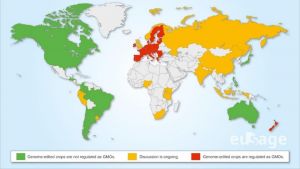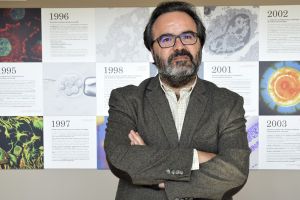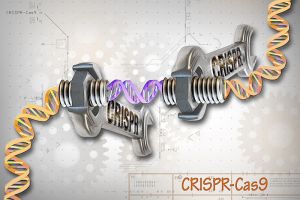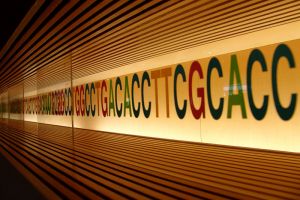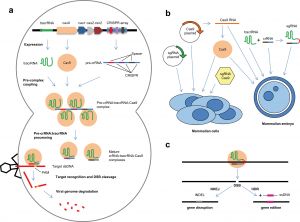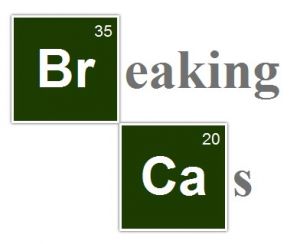- Un estudio internacional liderado por científicos españoles descifra el origen de la herramienta de edición genética CRISPR y constata su actividad original
- El trabajo, publicado en la prestigiosa revista científica Nature Microbiology, abre nuevas vías en la manipulación de ADN y en el tratamiento de enfermedades como el cáncer o la diabetes
Un grupo de investigación internacional ha reconstruido por primera vez ancestros del conocido sistema CRISPR-Cas de hace 2.600 millones de años y ha estudiado su evolución a lo largo del tiempo. Los resultados apuntan a que los sistemas revitalizados no solo funcionan, sino que son más versátiles que las versiones actuales y podrían tener aplicaciones revolucionarias. La prestigiosa revista científica Nature Microbiology ha dado a conocer los resultados de esta investigación que, en opinión del equipo investigador “abre nuevas vías para la edición genética”.
En el proyecto, dirigido por el investigador Ikerbasque de CIC nanoGUNE Rául Pérez-Jiménez, participan equipos del Consejo Superior de Investigaciones Científicas como el de Lluís Montoliu en el Centro Nacional de Biotecnología, la Universidad de Alicante, el Centro de Investigación Biomédica en Red de Enfermedades Raras (CIBERER), el Hospital Ramón y Cajal-IRYCIS y otras instituciones estatales e internacionales.
La edición genómica es una tecnología revolucionaria y cuya trascendencia ha sido reconocida con la concesión del premio Nobel a sus descubridores. Su aplicación a la mejora de cultivos trasciende al ámbito de la investigación.
La edición genómica es una nueva aproximación a la mejora genética basada en el conocimiento, que aprovecha las propias soluciones naturales de las plantas, y puede utilizarse paraa reducir los actuales requerimientos de insumos externos y haciendo posible una producción de alimentos más respetuosa con el medio ambiente.
La decisión del Tribunal de Justicia de la UE de someter las plantas mejoradas mediante edición genómica a la complicada y costosa regulación europea sobre Organismos Modificados Genéticamente (OMG) coloca a esta tecnología fuera del ámbito habitual de obtención y registro de variedades vegetales.
Esto supone un duro varapalo a las expectativas y promesas que la edición genética ofrece para la sostenibilidad y la competitividad de un sector como el agroalimentario, que tanta importancia tiene en nuestro país.
Las numerosas reacciones a esta sentencia han llevado a la UE a realizar un estudio sobre su importancia y su impacto en el seno de la Unión.
El CNB se une a las numerosas voces académicas y empresariales que reclaman una revisión de dicha legislación, de manera que no restrinja las enormes oportunidades que estas técnicas pueden aportar a la agricultura española y europea, incidiendo en la necesidad de crear unas condiciones favorables, basadas en la evidencia científica, para el desarrollo óptimo de la producción vegetal.
En este sentido, el CNB se une y apoya la carta lanzada por EUSAGE (European Sustainable Agriculture through Genome Editing), donde la comunidad científica representada por EU-SAGE señala la necesidad de que el estudio de la UE promueva un estatus regulatorio proporcionado y no discriminatorio para los cultivos mejorados mediante edición genética en la legislación europea, y que permita el desarrollo y la introducción en el mercado europeo de los cultivos con genomas editados.
Experts from across the continent recommend establishment of a European committee to review and evaluate the uses of new genetic tools. The new techniques are inexpensive, simple, rapid and have greatly expanded the range of potential applications; they are also moving millions of euros. Scientists consider it is time to launch a debate on the ethical and social implications of these tools, and to legislate their use and applicability.
Trends in Microbiology. 2016 July. doi: 10.1016/j.tim.2016.06.005
Francisco J.M. Mojica and Lluis Montoliu
Two outstanding representatives of CRISPR-Cas have come together to tell the story of a technique that, based on a secret closly guarded by bacteria for millions of years , has revolutionized the world of genetic editing. In a review article, the authors pay homage to basic research that, sooner or later, yields benefits.
Nucleic Acids Res. 2016 May 10. pii: gkw407
Oliveros JC, Franch M, Tabas-Madrid D, San-León D, Montoliu L, Cubas P, Pazos F.
Breaking-Cas is a web tool, developed at the Centro Nacional de Biotecnología of the CSIC (CNB-CSIC), that facilitates the design of gene editing experiments using the well-known CRISPR/Cas technique.The programme enables the design of the guide RNA (gRNA) needed for this technique, which is specific for each experiment.The software will allow researchers around the world to carry out CRISPR genome editing in nearly 700 eukaryotic organisms.
Curr Protoc Hum Genet. 2014; 83:15.7.1-15.7.27.
Harms DW, Quadros RM, Seruggia D, Ohtsuka M, Takahashi G, Montoliu L, Gurumurthy CB.
 The availability of techniques to create desired genetic mutations has enabled the laboratory mouse as an extensively used model organism in biomedical research including human genetics. A new addition to this existing technical repertoire is the CRISPR/Cas system. Specifically, this system allows editing of the mouse genome much more quickly than the previously used techniques, and, more importantly, multiple mutations can be created in a single experiment.
The availability of techniques to create desired genetic mutations has enabled the laboratory mouse as an extensively used model organism in biomedical research including human genetics. A new addition to this existing technical repertoire is the CRISPR/Cas system. Specifically, this system allows editing of the mouse genome much more quickly than the previously used techniques, and, more importantly, multiple mutations can be created in a single experiment.
Here we provide protocols for preparation of CRISPR/Cas reagents and microinjection into one-cell mouse embryos to create knockout or knock-in mouse models.
COOKIES POLICY
A cookie is a text file that is stored on your computer or mobile device via a web server and only that server will be able to retrieve or read the contents of the cookie and allow the Web site remember browser preferences and navigate efficiently. Cookies make the interaction between the user and the website faster and easier.
General information
This Website uses cookies. Cookies are small text files generated by the web pages you visit, which contain the session data that can be useful later in the website. In this way this Web remembers information about your visit, which can facilitate your next visit and make the website more useful.
How do cookies?
Cookies can only store text, usually always anonymous and encrypted. No personal information is ever stored in a cookie, or can be associated with identified or identifiable person.
The data allow this website to keep your information between the pages, and also to discuss how to interact with the website. Cookies are safe because they can only store information that is put there by the browser, which is information the user entered in the browser or included in the page request. You can not run the code and can not be used to access your computer. If a website encrypts cookie data, only the website can read the information.
What types of cookies used?
The cookies used by this website can be distinguished by the following criteria:
1. Types of cookies as the entity that manages:
Depending on who the entity operating the computer or domain where cookies are sent and treat the data obtained, we can distinguish:
- Own cookies: are those that are sent to the user's terminal equipment from a computer or domain managed by the editor itself and from which provides the service requested by the user.
- Third party cookies: these are those that are sent to the user's terminal equipment from a machine or domain that is not managed by the publisher, but by another entity data is obtained through cookies.
In the event that the cookies are installed from a computer or domain managed by the editor itself but the information collected by these is managed by a third party can not be considered as party cookies.
2. Types of cookies as the length of time that remain active:
Depending on the length of time that remain active in the terminal equipment can be distinguished:
- Session cookies: cookies are a type designed to collect and store data while the user accesses a web page. Are usually used to store information that only worth preserving for the service requested by the user at any one time (eg a list of products purchased).
- Persistent cookies: cookies are a type of data which are stored in the terminal and can be accessed and treated for a period defined by the head of the cookie, and can range from a few minutes to several years.
3. Cookies types according to their purpose:
Depending on the purpose for which the data are processed through cookies, we can distinguish between:
- Technical cookies: these are those that allow the user to navigate through a web page or application platform and the use of different options or services it exist as, for example, control traffic and data communication, identify the session, access to restricted access parts, remember the elements of an order, make the buying process an order, make an application for registration or participation in an event, use security features while browsing store content for dissemination videos or sound or share content via social networks.
- Customization cookies: these are those that allow the user to access the service with some general characteristics based on a predefined set of criteria in the user terminal would eg language, the type of browser through which you access the service, the locale from which you access the service, etc.
- Analysis cookies: they are those that allow the responsible for them, monitoring and analyzing the behavior of users of the web sites that are linked. The information gathered through such cookies are used in measuring the activity of web sites, application or platform and for the profiling of user navigation of such sites, applications and platforms, in order to make improvements function data analysis how users use the service.
Management tool cookies
This Website uses Google Analytics.
Google Analytics is a free tool from Google that primarily allows website owners know how users interact with your website. Also, enable cookies in the domain of the site in which you are and uses a set of cookies called "__utma" and "__utmz" to collect information anonymously and reporting of website trends without identifying individual users..
For statistics of use of this website use cookies in order to know the level of recurrence of our visitors and more interesting content. This way we can concentrate our efforts on improving the most visited areas and make the user more easily find what they are looking for. On this site you can use the information from your visit for statistical evaluations and calculations anonymous data and to ensure the continuity of service or to make improvements to their websites. For more details, see the link below privacy policy [http://www.google.com/intl/en/policies/privacy/]
How to manage cookies on your computer: disabling and deleting cookies
All Internet browsers allow you to limit the behavior of a cookie or disable cookies within settings or browser settings. The steps for doing so are different for each browser, you can find instructions in the help menu of your browser.
If you decline the use of cookies, since it is possible thanks to the preferences menu of your browser or settings, reject, this website will continue to function properly without the use of the same.
Can you allow, block or delete cookies installed on your computer by setting your browser options installed on your computer:
- For more information about Internet Explorer click here.
- For more information on Chrome click here.
- For more information about Safari click here.
- For more information about Firefox click here.
Through your browser, you can also view the cookies that are on your computer, and delete them as you see fit. Cookies are text files, you can open and read the contents. The data within them is almost always encrypted with a numeric key corresponding to an Internet session so often has no meaning beyond the website who wrote it.
Informed consent
The use of this website on the other hand, implies that you paid your specific consent to the use of cookies, on the terms and conditions provided in this Cookies Policy, without prejudice to the measures of deactivation and removal of cookies that you can take, and mentioned in the previous section.

